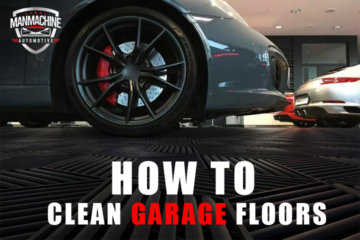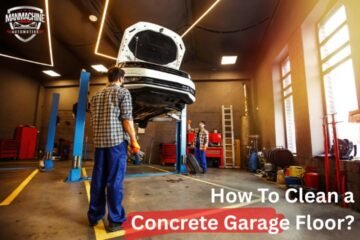Garage Floor Maintenance is generally overlooked, but it can withstand some harsh situations in any studio or commercial environment. The garage floor requires effective care to work operationally and visually, from oil spills and chemical spots to dust, tire scars, hefty equipment, or vehicle visitors.
Whether your space is utilized as a workshop, storage space, or just a space to park the automobile, it is crucial for protection, durability, and aesthetics.
Why Upkeep and Maintain Your Garage Floor
Here are the following pointers on why to maintain your garage floor as follows:
Garage Floor Maintenance isn’t always about just hygiene, but it plays a critical role in safety, durability, appearance, and public integrity of your space. Whether you’re a DIY fanatic, a car lover, or just use your space for parking, the proper floor care can save you money, enhance the value, and even add value to your area. Why does something mean right here:
1. Security first
One of the most immediate and crucial motives for retaining your space is to save you from the inconvenience. Garages usually face oil spills, water spills, antifreeze, cleaners, and other fluids from motor vehicles. If left unseen, these fluids can produce risky, dangerous surfaces. In addition, accumulated dust or a wet patch can cause slips and falls, which may be unsafe in a studio or work area with workers of all ages.
In addition, cracks, choppy surfaces, or pitted concrete with an uneven appearance may be intense tripping threats. For anyone who uses wheel equipment, automobiles, or mechanical rakes, such errors can cause objects to be tipped or stuck, resulting in injury or harm. By DIY Garage Floor Cleaning and inspecting the ground frequently, you create a secure, more practical work or running environment.
2. Lifetime
The Garage Floor Maintenance, specifically if it is coated with materials such as epoxy, polyaspartic, or seal concrete, is created to stand up to heavy use firmly, but only when correctly maintained. Over time, dirt, frozen, and chemical spills can affect the surface. Unseen oils and battery acids can enter coatings, weaken the substrate, and cause dyeing or peeling.
Continuous sweeping, washing, and resealing (as required) will improve the life of your garage floor. Think of maintenance as significant care; therefore, spending some time and effort today can assist you in avoiding expensive repair, revival, or entire replacement of the garage floor in the future.
3. Visual appeal
A clean, shiny garage floor improves the entire appearance and experience of your garage space. Whether you demonstrate your vehicle, operate a business, or work on detailing services projects, a perfect floor provides a polished and professional imprint. This is an awareness of expansion and pride in your space.
This is especially important:
- Auto detailing or Repair Companies are operated at home.
- Homeowners who want to sell their property (garages are an important sales point).
- An automobile enthusiast who uses their garage space as a showroom.
Even a bare concrete floor seems neater when they are clean and maintained. Proper maintenance aids in protecting the colour, shine, and pattern wholeness of premium floors such as epoxy or vinyl tiles.
4. Protection against damage
Your garage floor is exposed to elements such as sustained moisture, temperature rises, and road salts and motor vehicle chemicals. Without regular garage floor maintenance, these factors can be destroyed over time, which can lead to this:
- Cracks from freezing-thaw cycles
- Oil or rust stain
- Mildew or mould due to still water
- Delamination of coatings, such as epoxy
By maintaining the garage floor protection, you keep the surface clean. By examining it often, you can recognize early warning signs and symptoms of harm, incorporating hairline cracks, discoloration, bubbles, or soft spots. Taking action on these problems instantly assists in averting them from growing into highly priced structural issues.
In short, an active method of ground care now not only protects your investments but also keeps your garage purposeful, clean, and safe.
Types of Garage Flooring and Garage Floor Maintenance Necessities
Before discussing cleaning methods, it’s vital to understand the floor, as each requires precise care.
1. Concrete Floor Cleaning
General problems: stains, dirt, cracks.
Required cleansing tools: broom, degreaser, and mop.
Maintenance: The Seal is significant to prevent stains and boost longevity.
2. Epoxy-coated floor
General troubles: Oil spread, rubber marks.
A cleaning system is required: A Soft brush, pH-neutral cleaner, and water.
Maintenance: Avoid complex chemical substances; maintain the glow with periodic polishing.
3. PVC or vinyl ground tiles
General problems: Dirt accumulation in the seam and surface scuffing.
Cleaning device required: vacuum, mild detergent, microfiber mop.
Maintenance: Irregular resealing of joints; replaced broken tiles when required.
4. Rubber mat or interlocking tiles
General troubles: Moisture underneath tiles, trapped particles.
A cleansing system is needed: A leaf blower, a sponge mop, and a non-harsh cleanser.
Maintenance: Lift and clean beneath periodically.
Daily and Weekly Garage Floor Maintenance and Cleaning Routine
Consistency is vital in relation to floor cleaning. How to set a simple routine here:
Daily/After Use
- Remove unfastened debris consisting of leaves, sawdust, or gravel.
- Wipe right away with an absorbing pillow or material.
- Spot easy spots earlier than setting.
Weekly
- Remove the products that block access to the floor, like the toolbox or vehicle.
- Use a smooth broom or vacuum to clean corners and baseboards.
- Mop the floor with water and a suitable cleaner (pH plate for coated ground), which works as the best garage floor cleaner.
- Allow the floor to dry thoroughly or use microfiber material.
Methods of Deep Cleaning
When ordinary cleaning isn’t always sufficient, a deep cleaning can restore the garage floor.
1. For concrete floors
Essential substances: Broom, Degreaser, Hard Brush, Hose, or Pressure Washes.
Steps:
- Take out all loose dust and debris.
- Put a degreaser on the stained spots and scrub with a stiff brush.
- Leave the cleanser for 5-10 minutes.
- Wash properly with a hose or a pressure washer.
- Let it dry entirely.
Tip: Seal the ground every 1-2 years to save it from soaking up the strain.
2. For epoxy-lined floor
Substances Needed: Soft mop, pH-neutral detergent, water.
Steps:
- Clean off or vacuum the surface to take off gravel.
- Add a cleanser in warm water (according to the producer’s guidelines).
- Mop the surface properly without letting the water puddle.
- Wash with clean water and then dry it.
Avoid: Vinegar, citrus-based, or ammonia cleaners they affect the epoxy.
3. For PVC/Vinyl Floor
Necessary materials: Light detergent, hot water, microfiber mop.
Steps:
- Vacuum or sweep to prevent loose debris.
- Use a wet mop with diluted detergent to scrub the floor.
- Rinse with pure water and let it dry.
Alternative: Use vinyl polish for shine repair.
4. For rubber or interlocking tiles
Essential materials: Vacuum, sponge mop, non-harsh detergent.
Steps:
- Do remove the tiles periodically and clean up both the top and subfloor.
- Use a vacuum to take off any trapped particles.
- Mop the surface with a rubber-safe cleaner.
- Let it dry properly before reinstalling it.
Removal of Ordinary Garage Floor Stains
Below are a few basic steps for cleaning up the garage floor stains.
1. How to Remove Oil Stains from Garage Floors
- Use the cat’s litter or sawdust to absorb the fresh spill.
- Apply degreaser and Scrub with the help of a brush.
- Rinse properly and dry it.
2. Rust stain
- Use a rust remover.
- Let it sit and then scrub with a soft brush.
- Rinse thoroughly.
3. Paint spread
For liquid paints, use a rag and a solvent, such as mineral spirits.
For dried paint, scrape gently with a putty knife.
Warning: Never use steel wool or thread brush on epoxy or vinyl ground.
Season Garage Floor Maintenance
Below are the tips on seasonal garage floor maintenance that you need to do.
Monsoon
- To reduce water tracking, put the absorbent mat near the doorway.
- Use a dehumidifier to keep away moisture buildup.
- Check the water pooling and mould underneath the mat or tiles.
Winters
- Remove ice and snow as quickly as possible.
- Use a garage floor squeegee for standing water.
- Avoid salt-based deicer products as they can harm the coating.
Summer
- Use proper fans and provide ventilation to reduce moisture.
- Clean rubber tire streaks more often because of the softening of rubber in the summer season.
Garage Floor Maintenance Suggestions
Here are a few tips on garage floor maintenance.
- Apply a sealant (for concrete floors): averts stains and cracks.
- Recoat epoxy: after every 3-5 years for shine and protection.
- Avoid rigid chemicals: Use a garage-friendly, pH-neutral solution.
- Ventilate your garage: Reduces moisture and mildew problems.
- Regular inspection: Look for cracks, peeling, or raised tiles.
Tools and Products that Assist
Cleaning device checklist:
- Broom or shop-Vac
- Microfiber or sponge mop
- Pressure washing system (for strong cleaning)
- Floor squeeze
- Hard brush
- Bucket and rubber gloves
Recommended Garage Floor Maintenance and Cleaning Products
Below are some of the advised products for managing and keeping the garage floor clean.
- PH-neutral cleanser (for coated floors)
- Concrete degreaser
- Rust remover
- Absorbent powder (for oil)
- Tile-safe disinfectant
Bonus guidelines: Place a ground-specific cleaning kit in your place for simplicity.
Common Errors to Avoid while Doing Garage Floor Maintenance
Below you will find a few basic mistakes to avoid while cleaning up the garage floor.
- Using an acidic cleaner on a coated floor
They could make it look dull or strip the coating, like epoxy.
- Skipping sealing on concrete
Unsealed concrete absorbs stains faster and becomes difficult to clean if left unseen.
- Unseen spills
Even a small spill can lead to staining and damage if left unseen for years.
- Using abrasive equipment
Steel wool and a stiff brush can scratch off the coatings or smooth tiles.
- Drop off moisture
Especially under mats or tiles can lead to the consequences of lifted tiles.
Conclusion
With daily Garage Floor Maintenance, the right equipment, and perfect cleaning habits, you can keep your garage floor looking amazing and enhance its longevity. Whether you have a bare concrete or Manmachine Automotive garage floor, a cleaned floor, of course, adds value and touch to your garage. Manage your garage space like every other part of your private home, and it is worth taking care of it. Periodically sweeping, rapid cleanup, deep cleaning, and preventing typical mistakes increase its lifespan.
So the next time you park your vehicle or start a DIY task, you should take a second to understand the smooth, brilliant, safe garage floor and realise that with only a little effort, it’ll last an extended time.
FAQs
Q1. How frequently should I clean up my garage floor?
Once every 1-2 months, depending on use. More often, if it may be, or might not be required, if handled properly.
Q2. Can I use a vapour mop for epoxy flooring?
This isn’t always advised, as high heat can harm the coating over the years.
Q3. What is the best method to address tire marks on the epoxy floor?
Use a degreaser and smooth brush; Avoid solvents that can break the coating.
Q4. Should I remove tiles at the same time while cleaning up the interlocking ground?
Yes, periodically. The stuck moisture or dust can lead to trouble or problems on the surface.
Q5. Is it ok to wash the garage floor with a pressure washer?
Take precautions and be safe for concrete; however, delicately clean it, though it is never advised for epoxy, vinyl, or rubber tiles.



0 Comments